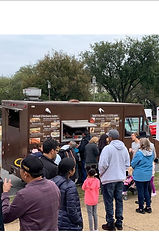[Free 2025 Guide] How to Start a Food Truck in Texas
Consider the weather and seasonal factors in Texas when planning the operation schedule and menu for the food truck. One should identify strategic locations and events in Texas that attract a large crowd, ideal for a food truck business. In Texas, it's important to understand the local food service regulations and obtain the necessary permits for operating a food truck.


Insurance Coverage for Food Trailers in Texas
Insurance Coverage for Food Trailers in Texas
In Texas, trailers with a Gross Vehicle Weight (GVW) of 4,000 lbs or more must be registered. The registration fee for food trailers depends on the weight: trailers between 4,000 lbs and 6,000 lbs are charged a $60 annual registration fee, while trailers over 6,000 lbs cost $100 annually.
Required documents for registration include a completed Form 130-U (Application for Texas Title and/or Registration), proof of insurance, a copy of the trailer title, and proof of identity (e.g., driver’s license). Farm-use trailers are exempt from registration, but must comply with safety regulations.
In Texas, the insurance on the towing vehicle generally extends to the food trailer, but food truck owners should also obtain collision insurance to cover any damage to their trailer or equipment.
The state requires a minimum liability insurance of $30,000 per person and $60,000 per accident.
Summarized Business Regulations for Cottage Food Laws in Texas
A Cottage Food Operation in Texas operates outside standard food service establishment rules, exempting it from compliance with state regulations. Health departments lack inspection authority over these operations, but they can intervene in emergencies affecting public health, issuing recall orders or emergency directives. Although exempt, health departments must document complaints lodged against Cottage Food Operations to track and address potential issues.
Example of Successful Food Trucks in Texas

Silo Park Food Truck
Cafe

Tatazo Food Truck
Mexican food

Yummy Pizza Food Truck
Pizza

How to Register and Title Your Food Truck in Texas [2025]
In Texas, trailers with a Gross Vehicle Weight (GVW) of 4,000 lbs or more must be registered. The registration fee for food trailers depends on the weight: trailers between 4,000 lbs and 6,000 lbs are charged a $60 annual registration fee, while trailers over 6,000 lbs cost $100 annually.
Required documents for registration include a completed Form 130-U (Application for Texas Title and/or Registration), proof of insurance, a copy of the trailer title, and proof of identity (e.g., driver’s license). Farm-use trailers are exempt from registration, but must comply with safety regulations.
Find a Food Truck for Sale in Texas

Texas Food Trailer Braking System Requirements
In Texas, trailers with a GVW over 3,000 lbs must have a separate braking system, which is typically electric.
Hydraulic systems are also allowed. Food trailers under 3,000 lbs are exempt from this requirement and do not need a braking system.
Lighting, Reflectors, and Safety Chains Requirements for Food Trailers in Texas
Texas law mandates that food trailers must have two red tail lights visible from at least 500 feet, amber reflectors on each side, and functioning turn signals. The trailer must also have at least one safety chain, rated to handle the full GVW of the trailer, connecting the hitch to the towing vehicle. The hitch must be securely attached to the towing vehicle and in good working order.

![Fast Track to Six-Figure Food Truck Profit in Texas [2025 Bundle with Guides, Calculators and Full Business Plan]](https://static.wixstatic.com/media/aec654_a953462005f048529544a07a6fce7a55~mv2.jpg/v1/fill/w_562,h_375,al_c,q_80,usm_0.66_1.00_0.01,enc_avif,quality_auto/aec654_a953462005f048529544a07a6fce7a55~mv2.jpg)































































